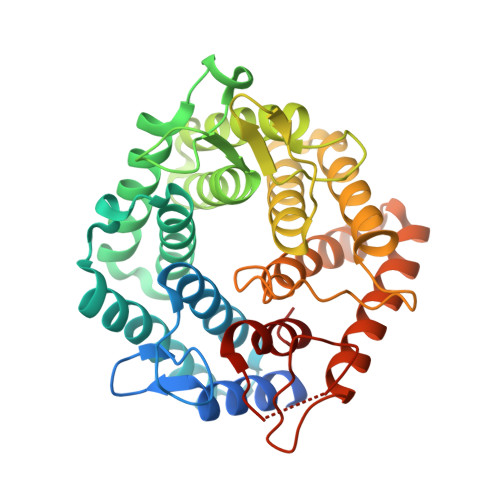Evidence for a Boat Conformation at the Transition State of Gh76 Alpha-1,6-Mannanases- Key Enzymes in Bacterial and Fungal Mannoprotein Metabolism
Thompson, A.J., Speciale, G., Iglesias-Fernandez, J., Hakki, Z., Belz, T., Cartmell, A., Spears, R.J., Chandler, E., Temple, M.J., Stepper, J., Gilbert, H.J., Rovira, C., Williams, S.J., Davies, G.J.(2015) Angew Chem Int Ed Engl 54: 5378
- PubMed: 25772148
- DOI: https://doi.org/10.1002/anie.201410502
- Primary Citation of Related Structures:
4D4A, 4D4B, 4D4C, 4D4D, 5AGD - PubMed Abstract:
α-Mannosidases and α-mannanases have attracted attention for the insight they provide into nucleophilic substitution at the hindered anomeric center of α-mannosides, and the potential of mannosidase inhibitors as cellular probes and therapeutic agents. We report the conformational itinerary of the family GH76 α-mannanases studied through structural analysis of the Michaelis complex and synthesis and evaluation of novel aza/imino sugar inhibitors. A Michaelis complex in an (O) S2 conformation, coupled with distortion of an azasugar in an inhibitor complex to a high energy B2,5 conformation are rationalized through ab initio QM/MM metadynamics that show how the enzyme surface restricts the conformational landscape of the substrate, rendering the B2,5 conformation the most energetically stable on-enzyme. We conclude that GH76 enzymes perform catalysis using an itinerary that passes through (O) S2 and B2,5 (≠) conformations, information that should inspire the development of new antifungal agents.
Organizational Affiliation:
Department of Chemistry, University of York, Heslington, York, YO10 5DD (UK).















